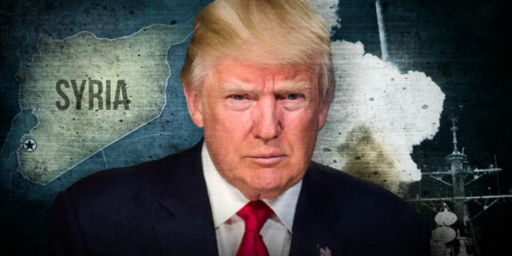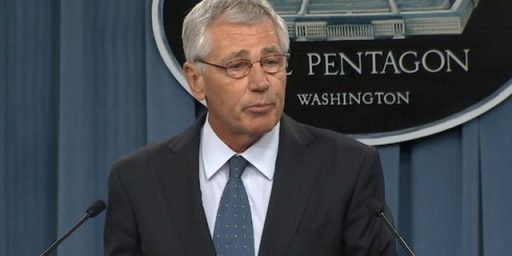Hagel: U.S. “Rethinking” Opposition To Arming Syrian Rebels
At a press briefing today, Defense Secretary Chuck Hagel stated quite clearly that the Administration is considering the option of sending arms to the Syrian rebels:
WASHINGTON (AP) — The Obama administration is rethinking its opposition to arming rebels opposed to the Syrian government, Defense Secretary Chuck Hagel said on Thursday.
At a Pentagon news conference, Hagel said the administration is considering a range of options. He said he personally has not decided whether it would be wise to provide weapons to the rebels.
“Arming the rebels — that’s an option,” he said. “We must continue to look at options.” He said the U.S. is considering a range of options in consultation with allies.
This statement follows a report in The Wall Street Journal that the Administration’s thinking about this option has changed in recent week:
WASHINGTON—TheObama administration has returned to the idea of arming moderate Syrian rebels, current and former officials said, because many officials see it as one of the few steps available to shore up the opposition without drawing the U.S. military into the two-year-old civil war.
Advocates see delivering weapons as the least invasive of the alternatives available to President Barack Obama. One former official called it the “best of the bad options.”
Mr. Obama is facing pressure to make good on his vow to take stronger action if he finds Syrian President Bashar al-Assad’s regime has used chemical weapons. The White House says U.S. intelligence agencies have evidence that the Assad regime likely has used chemical weapons, but Mr. Obama has said more evidence was needed.
For a president who wants to stay out of the Syrian war, providing weaponry would be the least risky way for the U.S. to punish Mr. Assad without committing to use direct force, current and former officials said.
A senior Obama administration official said the option of arming the rebels is now being actively considered, though a decision has yet to be made and arms transfers aren’t imminent.
The option, the official added, is both “the least of the slippery slope but also a reasonable next step on this trajectory of strengthening the opposition.”
Other options for Washington pose a heightened risk of pulling the U.S. into the war, including establishing a no-fly zone that would require U.S. forces to destroy Syrian antiaircraft batteries, U.S. officials said.
Of course, the question is what we do if it turns out that arming the rebels doesn’t turn the tide of the war. At that point, we’ve already stepped up to make a committment. So, what’s next?





These guys remind me of kids interpreting the word “maybe”.
Then we make an informed decision on whether we should do more or whether we should pull the plug. Contrary to popular belief (maybe even among members of the Administration), there is no slippery slope that leads the Administration to inevitably escalate a particular commitment to something other than what is originally undertaken .
I might add that we have already seen Obama pull the plug after committing to a particular course of action -the Afghan surge. He made the decision that we should commit to a surge, and when it did not work, he ended it, over the advice of our most renowned (at the time) general. Obama is aware of the concept of no slippery slope, and of reconsideration of a particular program after it has been tried and failed. In short, Obama ain’t Bush.(It really does matter who heads up your foreign policy team).
Note that the Administration seemingly agrees that it really is a matter of national interest who ends up running Syria, which shouldn’t be a surprise to anyone, really.
If more commitments are made, it should be only if there is a plan to win, and an exit strategy.
For a definition of winning, we need only look at General Grant: “No terms except unconditional surrender”.
“You can go home pig or pork” Marshall Dillon, “Gunsmoke”
“Damn the to torpedoes. Full speed ahead!!” Admiral David Farragut